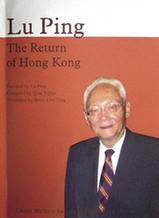The Zigzags of History
The Zigzags of History
By staff reporter LIU YI
|
 |
Lu Ping: The Return of Hong Kong Narrated by Lu Ping, compiled by Qian Yijiao, translated by Betty Lew Ting 238 pages RMB88 Published in Shanghai by the China Welfare Institute Publishing House |
"MR. Patten's mistakes will be written into history and will be condemned for all time." Lu Ping impressed the world with his unflinching comment on the last British governor of Hong Kong, at a press conference following an unpleasant meeting between the two in Beijing in 1993.
Talking about this event frankly in his newly launched memoir, Lu says he has “no regrets in condemning him.” As former director of the Hong Kong and Macao Affairs Office (HMO), he believes the return would have been much smoother if Chris Patten had not initiated his political reform plan, a drastic change in British policy towards Hong Kong, in 1992. Lu considers the plan to be disruptive of a previously written diplomatic agreement between China and Great Britain for a peaceful political transition.
Throughout the process of Hong Kong’s return to China, Lu faced even knottier problems than negotiating with a hardliner like Mr. Patten. The building of a new airport was one of them.
In 1990, Patten’s predecessor David Wilson made public the “Rose Garden Project,” which was to build a new airport for HKD 127 billion. The Chinese government learned about it only from newspapers. Concerned about Hong Kong’s continued position as an international financial and trade center, Beijing had been watching the new airport issue for a long time and was shocked when David announced the project. The concern was: after spending HKD 127 billion, how much financial reserve would be left for the Hong Kong Special Administrative Region (HKSAR) by June 30, 1997, the last day of British rule? The answer was five billion. “You must be kidding,” Lu Ping told Wilson. In addition, a large part of the investment was bank loans which would be due after 1997. Another round of talks were launched. After four days of toothpaste-squeezing negotiation, a memorandum was reached in which HKD 25 billion would be left for HKSAR.
Since joining the HMO in 1979, Lu had devoted almost 20 years of his life to ensuring the return of Hong Kong to Chinese sovereignty. Nicknamed “grey-hair” by Hong Kong people, he was deeply involved in the entire process, from formulating the general and specific policies to negotiating with the British and finally to arranging the returning ceremony. Much of his memoir addresses the period of transfer, which consisted of dozens of rounds of tough negotiations, sustained diplomatic efforts, and interesting vignettes. The book has unveiled valuable historical documents, such as the “Memorandum of Understanding Concerning the Construction of the New Airport in Hong Kong and Related Questions,” and “Chris Patten’s Political Reform Plan.” It has also reflected various perspectives from the media, including the “Death of Hong Kong.”
But Hong Kong didn’t die. Now 12 years have passed, and Hong Kong has continued to do well. It succeeded in a smooth transition of power, and weathered both the 1998 Asian financial crisis and the anxious days of the SARS outbreak in 2003.
On July 6, 1997, five days after Hong Kong’s return, Lu resigned from his position as head of the HMO at the age of 70. He returned to his birthplace Shanghai, and started to work for the China Welfare Institute, a charity established by Soong Ching Ling, for whom he worked as a young man back in the early 1950s.
After Soong Ching Ling launched this magazine in 1952, then named China Reconstructs, Lu joined it as a staff reporter. Later Lu worked as head of the editorial department until the “cultural revolution” broke out in 1966.
The English edition of The Return of Hong Kong is translated by Betty Lew Ting, Lu Ping’s old colleague, an experienced Chinese-English translator, during his days of China Reconstructs.
Services
Economy
- Eco-agriculture and Eco-tourism Power Nanchang’s Green Development
- Balance Environmental Protection and Economic Prosperity – Nanchang Looks to European Technology for Green Development
- Sustainable Growth Requires Wiser Energy Use
- Chinese Economy: On the Path of Scientific Development
- China's Economy over the Last Ten Years

